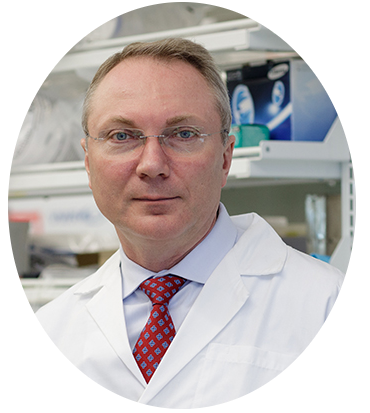Principal Investigator
Igor Efimov
PhD, FNAI, FAIMBE, FAHA, FHRS
Professor of Biomedical Engineering,
Professor of Medicine (division of Cardiology)
Northwestern University, Chicago, IL
Editor-in-Chief, Cardiovascular Engineering & Technology
-
Professor Efimov is the Director of Cardiovascular Engineering Laboratory, an NIH-funded cardiovascular research and engineering laboratory, which focusses on the physiological mechanisms of cardiovascular disease and on development of novel therapies for heart diseases with emphasis on heart rhythm disorders. Dr. Efimov earned his M.Sc. and PhD from Moscow Institute of Physics and Technology in 1986 and 1992, respectively, and completed his postdoctoral training at the University of Pittsburgh (1992-1994). He served on the faculty of the Cleveland Clinic Foundation (1994-2000) and Case Western Reserve University (2000-2004) in Cleveland, OH, and Washington University in St. Louis, MO (2004-2015), and the George Washington University (2015-2022), where he served as the founding chairman of its new BME Department. In April 2022, Dr. Efimov joined the faculty of Northwestern University, Chicago IL.
Dr. Efimov is Fellow of National Academy of Inventors, the American Institute for Medical & Biological Engineering, the Heart Rhythm Society, the American Heart Association, etc. He has received numerous awards including: 2021 Heart Rhythm Society Distinguished Scientist Award, RASA George Gamow Prize, Astor Visiting Fellowship at University of Oxford, Washington University Chancellor’s Hartwell Prize for Innovative Research, The Doris J.W. Escher Lectureship at Montefiore Medical Center of the Albert Einstein College of Medicine, Walter Lillehei Lectureship at University of Minnesota, Richard B. and Lynne V. Cheney Lectureship at the George Washington University, etc.
Dr. Efimov founded Cardialen to develop low energy implantable electrotherapy for cardiac arrhythmias. Cardialen has raised over $30M in venture and federal funding and is conducting clinical trials worldwide. Dr. Efimov also co-founded NuSera Biosystems to develop new catheter technology for mapping and ablation of arrhythmias.
Dr. Efimov is current Editor-in-Chief of Cardiovascular Engineering & Technology, journal of Biomedical Engineering Society. He served as Associate Editor of the American Journal of Physiology: Heart and Circulatory Physiology and IEEE Transactions in Biomedical Engineering. He has served on editorial boards of Journal of American College of Cardiology: Clinical Electrophysiology, Circulation Research, Heart Rhythm Journal, Journal of Cardiovascular Electrophysiology, Journal of Molecular and Cellular Cardiology, Scientific Reports, and other journals. He served as a chartered member of NIH Electrical Signaling, Transporters and Arrhythmia (ESTA) Study Section.
He served on numerous international expert panels of the World Bank, Canadian Academies, British Heart Foundation, Russian Ministry of Science and Education, the Royal Society of New Zeeland, Swiss National Science Foundation, National Sciences and Engineering Research Council of Canada, and other international organizations.
Staff
Paloma amaral
Research Associate
-
Research Associate Paloma manages most of the administrative and operational needs in support of the lab. She coordinates lab safety and animal protocols to ensure compliance with policies and guidelines. In addition, she participates in many ongoing projects which includes the effects of exercise on cardiac physiology and the development of implantable bioelectronic devices and animal models of cardiovascular disease.
Eric Rytkin
Research Associate
-
Eric Rytkin is a Research Associate in the Efimov Lab. After obtaining his MD he further specialized in interventional cardiology/interventional radiology and defended his PhD thesis featuring antithrombotic treatment of patients with atrial fibrillation and acute coronary syndrome. Dr. Rytkin joined the Efimov Lab in 2021 as a postdoctoral scientist before moving to Northwestern University as a Research Associate. His research is focused on the bench-to-bedside development of minimally-invasive medical devices for cardiac applications.
Education: MD-Sechenov University, Moscow, Russian Federation, (2009-2016)PhD-Sechenov University, Moscow, Russian Federation, 2021
Faculty
Tatiana Efimova, Phd
Research Associate Professor
Department of Biomedical Engineering
Robert R. McCormick School of Engineering and Applied Sciences
Associate Editor, Molecular Carcinogenesis
-
Dr. Efimova is a Research Associate Professor in the Department of Biomedical Engineering. Her research focuses on stress signaling and adaptation mechanisms in skin and oral cavity cancer, skin inflammatory diseases, wound healing, and cardiac dysfunction related to cancer therapy. Dr. Efimova received her M.Sc. from the Moscow Institute of Physics and Technology and completed her doctoral and post-doctoral training at Case Western Reserve University (CWRU) in Cleveland, OH. She served on the faculty of the CWRU, Washington University in St. Louis, MO, and George Washington University in Washington, DC before joining the faculty of Northwestern University in Chicago, IL in November 2022. Dr. Efimova served as PI on the projects supported by the NIH R01 funding and grants from the Dermatology Foundation, the American Cancer Society, the American Skin Association, and university-funded grants. Dr. Efimova’s research was published in leading dermatologic, physiology, and cancer biology journals. Dr. Efimova has presented her research at academic institutions and national and international conferences, including the Society of Investigative Dermatology (SID) and International Societies for Investigative Dermatology (ISID) annual meetings, the Epithelial Biology Gordon Research Conferences, and the Skin Carcinogenesis Conferences.
Dr. Efimova is an active member of the SID and serves as a Co-Chair of the SID’s Standing Committee on Diversity and Inclusion. She served as an abstract reviewer and sessions co-chair at several SID and ISID conferences. Dr. Efimova served as Associate Editor and Section Editor of the Journal of Investigative Dermatology, topic editor for a Special Topic Issue, "New Tools and Molecular Advances into Hyperproliferative Skin Disorders," in Frontiers in Medicine Dermatology, and currently serves as an editorial board member for the Molecular Carcinogenesis journal. In recent years, Dr. Efimova has served as an ad hoc grant reviewer at the NIH Arthritis Connective Tissue and Skin Study Section and the NIH Special Emphasis Panel/Scientific Review Group ZRG1 IMM-G, as well as for several other national and international funding agencies, including the Association for International Cancer Research and Medical Research Council, UK.
Postdoctoral Scholars
Micah Madrid, PHD
-
Coming Soon!
Alexandru Mircea
-
Alex Mircea is a postdoctoral scientist who joined the Efimov Lab in 2023. After obtaining his MD from Carol Davila University of Medicine and Pharmacy, he went on with an MSc in electromechanical heart disease at IHU Lyric (Bordeaux, France). His work focuses on machine and deep learning techniques to improve arrhythmia diagnosis and treatment. He is currently working on precision-based medicine methods for arrhythmia prevention as well as cardiac device function improvement.
Education:
Carol Davila University of Medicine and Pharmacy (2017-2023) - MD
Universite de Bordeaux (IHU Lyric) - MSc in electromechanical heart disease
Universite de Lausanne/Centre Hospitalier Universitaire Vaudois - PhD(c)
Graduate Students
Katy Trampel
-
Katy Trampel is a third-year biomedical engineering doctoral student. In September 2019, she began working in the Efimov Lab as an undergraduate researcher. She has worked on several projects with Dr. Sharon George. For the cardiac metabolism project, they are working on creating a chamber-specific metabolic profile of the human heart. On the exercise project, she is studying the electrical and structural effects of moderate endurance exercise on mice hearts. For the cardiac oncology project, she is studying the effects of doxorubicin on the heart and the roles of different isoforms of the p38 stress signaling pathway. She is looking forward to continuing her studies at the Efimov Lab at Northwestern University.
Education:
BS–Biomedical Engineering, The George Washington University, (2018-2022)
Lichao James Tang
-
Lichao (James) is a joint PhD student in Dr. Igor Efimov and Dr. John Rogers' lab majoring in Biomedical Engineering since 2022. His research centers on the development and validation of novel bioelectronic devices for cardiovascular applications, including cardiac sensors for continuous monitoring and minimally invasive pacemakers designed for on-demand electrotherapy. Driven by a passion for bridging engineering and medicine, he is dedicated to exploring bioelectronic technologies that advance the diagnosis and treatment of heart disease.
Education
BS-Biomedical Engineering, Georgia Institute of Technology, Atlanta, GA(2016-2020)
MS–Biomedical Engineering, Northwestern University (2021–2022)
Binjie Li
-
Binjie Li is a PhD student in Efimov Lab from 2022. Before coming here, he was working on engineered heart tissue to study maturation, cardiac disease, and therapeutic strategies. Now he is investigating the mechanism of the remodeling phenomena in CM cells during atrial fibrillation, through microtissue and animal models. He is also interested in the role of mechanical stimuli in cardiac development. He is always passionate about interdisciplinary research involving engineering and biology.
Education:
BS - Mechanical Engineering, Zhejiang University (2015-2019)
MS - Biomedical Engineering, Duke University (2019-2021)
PAVAN BHAT
-
Pavan Bhat is a JD/PhD student in Efimov Lab from 2023. Before coming here, he was working on machine learning and molecular dynamics simulations of lipids. Now he is investigating the use of novel bioelectronic devices for cardiac mapping in large animal models, as well as the impact of spinal cord stimulation on cardiac outcomes.
Education
B.S. Bioengineering, University of Maryland 2023
Charles Stark
-
Charlie Stark is a first-year graduate student in Northwestern's Medical Scientist Training Program, pursuing a combined Medical Doctorate and Doctor of Philosophy in biomedical engineering. Charlie received his Bachelor and Master of Science in biomedical engineering from Northwestern in 2021 before working for two years as a researcher in Dr. Joseph Woo's laboratory at Stanford School of Medicine. Charlie's research and clinical interests are in cardiovascular medical devices and cardiac electrophysiology.
Education
B.S. Biomedical Engineering, Northwestern University, 2021
M.S. Biomedical Engineering, Northwestern University, 2021
Undergraduate Students
Batool Salman
-
McCormick Summer Research Awardee 2024
Altynai Melisova
Alumni
Ph.D. students (name, degree start date, completion date)
1. Micah K. Madrid, 2019-2024. Current position: clinical scientist, Abbott Laboratories. Santa Clara, CA.
2. Zexu Lin, 2018-2023. Current position: clinical scientist, Abbott Laboratories. Santa Clara, CA.
3. Anna Gams, 2017-2022. Current position: data scientist, Coremap. Boston, MA.
4. Rose Yin, 2017-2021. Current position: Postdoctoral Research Associate, MIT, Cambridge MA.
5. Jaclyn Brennan, 2015-2020. Current Position: Senior Monitoring & Evaluation Advisor USAID.
6. John Qiao, Ph.D. 2013-2018. Current position: senior scientist, St. Jude Medical/Abbot. Los Angeles, CA.
7. Christopher Gloschat, Ph.D., 2012-2017. Current position: Senior scientist, St. Jude Medical/Abbot. Los Angeles, CA.
8. Chaoyi Kang, Ph.D. 2012-2016. Current position: senior scientist, St. Jude Medical/Abbot. Los Angeles, CA.
9. Sarah Gutbrod, Ph.D., 2010-2015. Current position: Senior Scientist, Boston Scientific. Minneapolis, MN.
10. Matthew Sulkin, Ph.D., 2010-2015, Current position: Boston Scientific. Minneapolis, MN.
11. Katherine Holzem, M.D., Ph.D., 2009-2015. Current position: vascular surgery fellowship, Washington University School of Medicine. St. Louis, MO.
12. Di Lang, Ph.D., 2008-2013, Current position: postdoctoral research scientist, University of Wisconsin. Madison, WI.
13. Jacob Laughner, Ph.D., 2009-2013, Current position: Senior scientist, Boston Scientific. Minneapolis, MN.
14. Christina Ambrosi, Ph.D., 2006 – 2011, Current position: postdoctoral research associate, Stony Brook University, NY.
15. Wenwen Li, Ph.D., 2007 – 2011. Current position: Senior Scientist, Abbot/St. Jude Medical.
16. Qing Lou, Ph.D., 2007 – 2011. Current Position: postdoctoral research associate, Ohio State University. Columbus, OH.
17. William Hucker, M.D., Ph.D., 2004 - 2007. Current position: Assistant Professor of Medicine (Cardiology), Harvard Medical School.
18. Crystal M. Ripplinger, Ph.D., 2004 - 2008. Current position: Associate Professor of Pharmacology, University of California, Davis, CA.
19. Fujian Qu, D.Sc., 2001 - 2006. Current position: Principle Scientist, St. Jude Medical/Abbot. Sa Jose, CA.
20. Li Li, Ph.D., 2000 - 2005. Current position: Instructor, University of Utah. Salt Lake City, UT.
21. Alexandre T. Sambelashvili, Ph.D., 2000 – 2004. Current position: Director, Medtronic. Minneapolis, MN.
Postdoctoral trainees and advisees
1. Jaclyn Brennan, PhD, Postdoctoral Fellow 2020-2021. Current Position: Senior Monitoring & Evaluation Advisor USAID.
2. Sharon George, PhD, 2017-2024, Postdoctoral Fellow. Current Position: Assistant Professor Department of Pharmacology and Chemical Biology at the University of Pittsburgh
3. Kedar Aras PhD, 2016-2022. Research Associate, Current Position: Assistant Professor, Department of Physiology & Biophysics and in the Department of Biomedical Engineering at State University of New York at Buffalo (UB), Jacobs School of Medicine and Biomedical Sciences
4. Rokhaya Faye, PhD, 2017-2020, Research Scientist. Current Position: Senior Scientist, University of Bordeaux.
5. Timothy Holleran, 2020-2021. Surgery fellow.
6. Michael Napolitano, 2019-2021. Surgery fellow.
7. Ethan Rosenfeld, 2019-2020. Surgery fellow.
8. Sheena Chen, MD. 2018-2020. Surgery fellow.
9. Jeffrey Panting, MD. 2018-2019. Surgery fellow.
10. Alexandro Murillo, MD. 2017-2018. Surgery fellow.
11. Ben Lee, MD. 2017-2019. Surgery fellow.
12. Matt Skancke, MD. 2016-17. Surgery fellow.
13. Kendal Endicott, MD. 2015-16. Surgery fellow.
14. Bastian Boukens, Research Associate. Current Position: Assistant Professor, AMC, University of Amsterdam, the Netherlands.
15. Fu Siong NH, MD, Research Associate. Current position: Senior Lecturer in Cardiology (Associate Professor), Imperial College London, UK.
16. HeyJin Hwang, MD, Visiting Professor.
17. Deborah Janks, PhD, Research Associate. Current Position: Research Associate, Washington University in Saint Louis, MO.
18. Ajit Janadrhan, MD, PhD, Cardiology Fellow. Current: Clinical cardiac electrophysiologist, Fort Walton Beach Medical Center and Cape Canaveral Hospital, Fort Walton Beach FL
19. Alexey Glukhov, PhD., Research Associate. Current Position: Associate Professor, University of Wisconsin, Madison WI.
20. Vadim Fedorov, PhD, Research Assistant Professor. Current Position: Professor of Physiology, Ohio State University, Columbus, OH.
21. Vladimir Nikolski, Ph.D., Research Assistant Professor. Current Position: Principle Scientist, Medtronic.
22. Alena Nikolskaya, PhD, Research Associate. Current Position: Senior Scientist, Medtronic.
23. Noriko Niwa, MD, Research Associate. Current Position: Research Associate, Washington University School of Medicine.
24. Yuanna Cheng, M.D., Ph.D., Research Associate. Current Position: Scientific Review Administrator, NIH.
25. Gil Bub, Ph.D., Research Associate. Current Position: Assistant Professor, McGill University, Montreal Canada.
26. Florence Rothenberg, M.D., Research Associate. Current Position: Professor of Medicine (Cardiology), University of Cincinnati, OH.
27. Ayman S. Al-Khadra, M.D. Clinical Fellow. Current Position: President, Saudi Heart Rhythm Society. Staff Cardiologist, King Fahd Armed Forces Hospital, Jeddah, Kingdom of Saudi Arabia
28. Stephane Garrigue, MD, Clinical Fellow. Current Position, Clinical Cardiac Electrophysiologist, Associate Professor University of Bordeaux, France.













